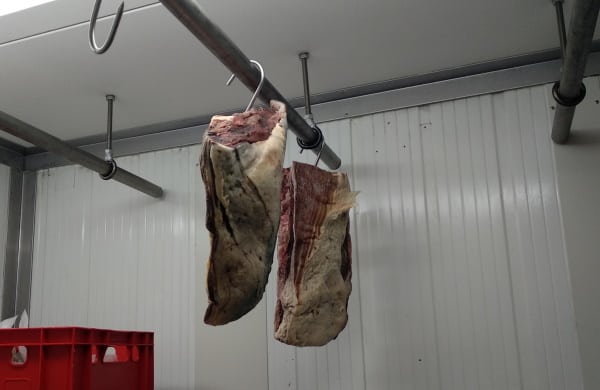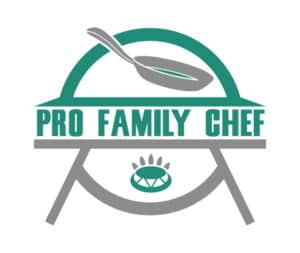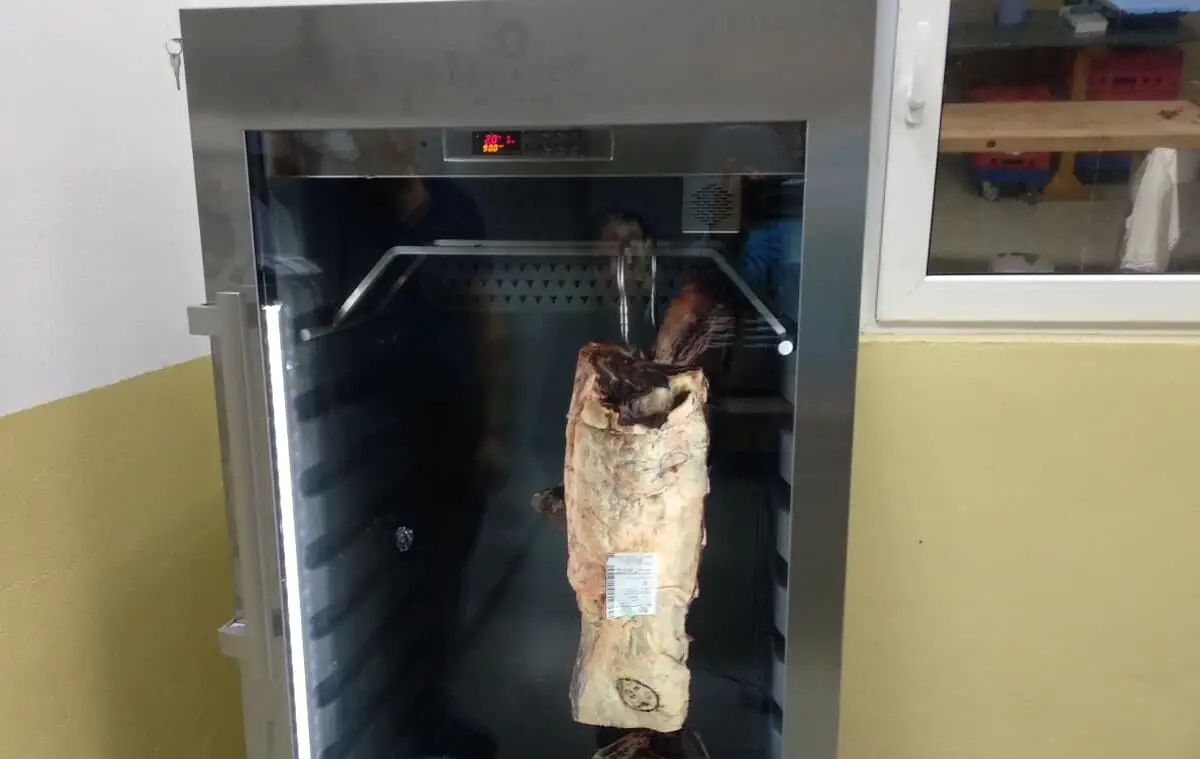There’s nothing more satisfying than biting into a well-aged piece of steak. Dry-aged streaks have a lot more flavor and are much more tender than the steaks you might buy in a grocery store.
Dry-aging meat follows a rigorous format and requires the right equipment. But, have you ever wondered?
Can you dry age frozen meat?
It is possible to dry age meat that has been previously frozen. The meat will need to be thawed before it can be dry-aged. Freezing meat before dry-aging may influence the aging process and, in some cases, may prevent the meat from aging. Frozen meat cannot be dry-aged.
What is dry aging?
Dry aging meat removes moisture over a prolonged period to enhance the flavor profile and tenderness of the meat.
Beef is slaughtered and hung in a temperature-controlled room for a few weeks or even months. The meat is then removed and cut into smaller steaks. During the dry-aging process, a series of chemical reactions occur in the meat that transforms the texture and taste of the beef.
These reactions include oxidization and bacterial and enzymatic breakdown. The juices of the meat are absorbed, and the fat and protein structures start to break down. The chemical responses give it the flavor and tenderness that make dry-aged meat desirable. The flavor profile obtained from this process is a nutty, beefy, and almost cheesy aroma.
What is the ideal temperature to dry age meat?
This is an important point! A 2016 study on dry aging beef determined that the ideal temperature to dry age your meat is between 32 °F and 39.2 °F. This temperature is controlled and monitored throughout the aging process to ensure the quality of the final product.
According to the United States Meat Export Federation, if the temperature in the controlled room exceeds 39.2 °F, there is a significant risk of meat spoilage during the process. And, if the temperature drops below 32 °F, the aging process stops because the meat starts to freeze.
What is the ideal humidity in a controlled room?
USMEF explains that the control room’s relative humidity should be between 80 and 85%. However, a 2016 review indicated that the ideal humidity should be between 75 and 80%.
USMEF indicated that humidity levels that exceed 85% would result in meat spoilage, while levels that dip below 80% result in excess weight and trim loss.
What is the ideal air flow in a control room?
USMEF further indicates that the ideal airflow in a controlled environment where meat is dry aged is 0.5 – 2 m/s (1.6 – 6.6 ft/s. When values exceed this amount, it results in excessive trim and weight loss, and when values fall below this amount, it results in microorganism growth, resulting in spoilage.
Can you dry age frozen meat?

The big question then remains: can you dry age frozen meat?
The short and simple answer is yes and no. You will need to thaw the meat before you start to dry age it. You cannot thaw the meat in the temperature-controlled room. Doing so will result in meat spoiling. Let’s take a simple example. If you take the meat out of the freezer and thaw it in the refrigerator for ten days, the meat will start to spoil after about three to four days.
Similarly, putting a frozen piece of meat in a temperature-controlled room will defrost the beef at a plodding pace and risk putting the meat in the danger zone between 40°F and 140 °F. In addition, the meat’s taste, texture, and quality will not be up to the high standard of properly dry-aged beef.
And, you risk the meat not aging correctly or at all. When meat is frozen, specific chemical reactions occur within the meat. The water in the beef expands and then crystallizes—thawing the meat results in a certain amount of moisture loss. The crystals rupture the fiber of the meat. Defrosting the meat will cause it to bleed out. The result is a mushy piece of meat.
When meat is dry aged, the enzymes break down the protein structures. This process is slow and deliberate. When meat is frozen, the water in the meat crystallizes. Thawing the meat ruptures the protein structure. Defrosting is usually quick in comparison to aging. Defrosting causes the distortion of the protein structure and inhibits the breakdown required in the aging process. For this reason, frozen or previously frozen meat does not age like chilled, freshly cut meat.
So why do some people believe that you can dry age frozen meat?
It’s not entirely impossible to dry age previously frozen meat. You can still thaw the meat and put it in the temperature-controlled room. However, the result and the quality will not be the same as adequately dry-aged meat.
On the other hand, when it comes to putting a piece of frozen meat in a dry-aging machine, this will not work at all. As previously explained, you cannot put frozen meat in this temperature-controlled environment because it is not conducive to thawing. It is designed to age meat.
Can you freeze dry-aged beef?
You may be curious whether you can dry-age beef and then put it in the freezer. The biggest concern for most people who spend a lot of money on dry-aged meat is whether freezing it will affect its quality or, even worse, ruin it.
You can dry-age your meat and then put it in the freezer. Or, if you just purchased an expensive piece of meat and you won’t be using it immediately, you can put it in the freezer for use at a later stage. It will not affect the meat’s taste, texture, or quality.
The short and simple answer is yes: you can freeze dry-aged meat.

